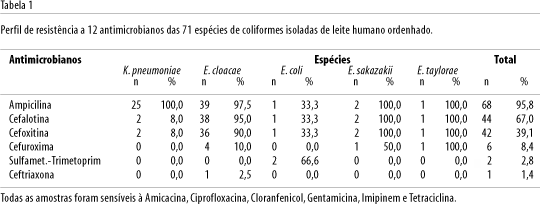The dispersion of potentially pathogenic, antibiotic-resistant microorganisms via expressed human milk can be considered a risk factor. The aim of this study was to contribute to a better understanding of coliform isolates from expressed human milk and their antimicrobial resistance profiles. The sampling scheme followed a totally randomized design, using 837 samples of expressed human milk. Of these, 71 (8.48%) were identified as contaminated with total coliforms, although in none of the samples did the population exceed 1.0x10³ MPN/ml. Most of the microorganisms isolated (91.6%) belonged to only two species, Enterobacter cloacae and Klebsiella pneumoniae, which when subjected to antibiograms, revealed that several strains showed prior resistance to some of the antimicrobials tested. Coliforms may grow in expressed human milk if it is improperly stored, depleting protection factors and reducing the milk's nutritional value.
Human Milk; Enterobacteriaceae; Microbial Drug Resistance



